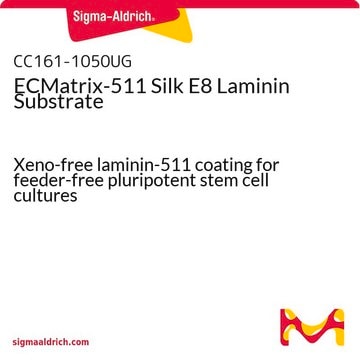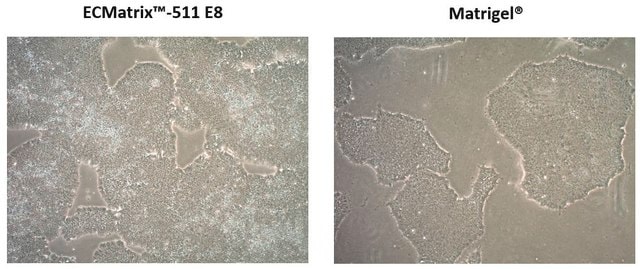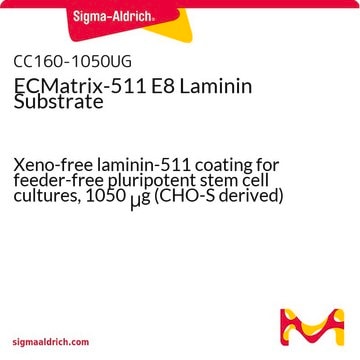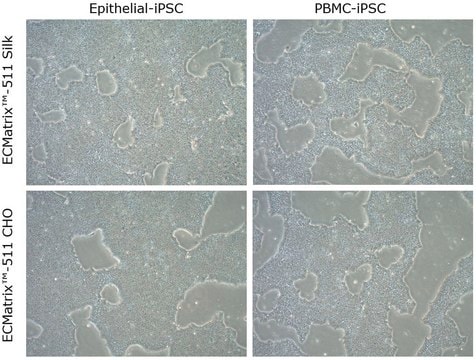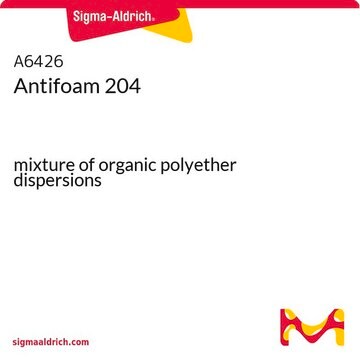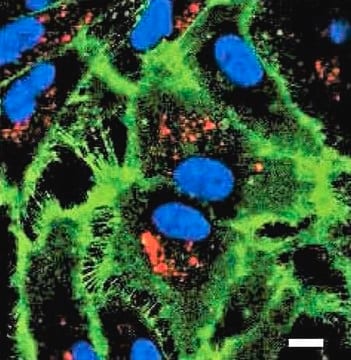CC160-350UG
ECMatrix-511 E8 Laminin Substrate
Xeno-free laminin-511 coating for feeder-free pluripotent stem cell cultures, 350 μg (CHO-S derived)
Synonym(s):
E8 Laminin, E8 Laminin Substrate, ECMatrix Laminin Substrate
About This Item
Recommended Products
form
liquid
packaging
pkg of 2 x 175 μg
technique(s)
cell culture | stem cell: suitable
storage temp.
2-8°C
General description
“Human ES cells grown on the ECMatrix substrate have high cell viability, proliferation and were able to differentiate after multiple passages. Additionally, the substrate saves us time by eliminating the need to pre-coat cultureware" - Senior Stem Cell Scientist, Regenerative Medicine Process Development Group.
Human pluripotent stem cells (ES and iPS cells) express α6β1 as the major integrin species and therefore can be maintained stably and expanded efficiently in feeder-free conditions on culture vessels coated with it′s binding partner laminin-511. However, laminin-511 is not suitable for large-scale production because of its large molecular weight and heterotrimeric nature. Professor Kiyotoshi Sekiguchi′s group (Matrixome, Inc.) have solved this problem by producing a recombinant E8 fragment of laminin-511 at large-scale while retaining the full integrin binding activity.
Application
Features and Benefits
- Animal-free, xeno-free format: Consistent from lot-to-lot with no prescreening required
- No plate precoating required: Save time by simply adding to media while passaging cells
- Supports single cell passaging w/out ROCKi: Great for CRISPR editing or clonal isolation
- Higher adhesion and growth rates: Get to your experiments faster
- Easy to handle: No chilling of cell culture consumables required
Packaging
Components
Quality
- Purity (SDS-Page): > 95%
- Endotoxin Test: = 750 EU/mg
- Mycoplasma Test: Negative
- Sterility Test: Negative
- Integrin Binding Assay (kDa) = 10 nM
Preparation Note
Non-Precoating Method:
1. Detach cells into small clumps or single cells using Accutase.
2. Add ECMatrix-511 to fresh media at a final concentration of 0.25 μg/cm2 (for example: for one well of a 6-well plate add 5 uL of the 0.5 mg/mL stock solution).
3. Add cells to the ECMatrix-511/Media and plate the cells at desired density.
Precoating Method:
1. Dilute the 0.5 mg/mL stock solution with sterile PBS to achieve a 2.5 μg/mL working solution.
2. Coat dishes with ECMatrix-511 at 0.25 μg/cm2 (for example, for one well of a 6-well plate add 1 mL of the 2.5 μg/mL working solution).
3. Incubate for 1 hour at 37°C, 3 hours at room temperate or overnight at 4°C.
4. Before use, remove remaining fluid from the coated surface (do not rinse).
5. Detach cells into small clumps using Accutase.
6. Plate the cells at desired density.
Note: Do not allow the plates to dry, briefly spin down all liquids in the tube before use, avoid repeated freeze-thaw cycles.
Storage and Stability
Disclaimer
Storage Class Code
12 - Non Combustible Liquids
Flash Point(F)
Not applicable
Flash Point(C)
Not applicable
Certificates of Analysis (COA)
Search for Certificates of Analysis (COA) by entering the products Lot/Batch Number. Lot and Batch Numbers can be found on a product’s label following the words ‘Lot’ or ‘Batch’.
Already Own This Product?
Find documentation for the products that you have recently purchased in the Document Library.
Articles
Read types of stem cells including multipotent stem cells, Pluripotent stem cells and iPSCs and their applications in basic stem cell research, stem cell therapy and disease modelling
Read types of stem cells including multipotent stem cells, Pluripotent stem cells and iPSCs and their applications in basic stem cell research, stem cell therapy and disease modelling
Read types of stem cells including multipotent stem cells, Pluripotent stem cells and iPSCs and their applications in basic stem cell research, stem cell therapy and disease modelling
Read types of stem cells including multipotent stem cells, Pluripotent stem cells and iPSCs and their applications in basic stem cell research, stem cell therapy and disease modelling
Our team of scientists has experience in all areas of research including Life Science, Material Science, Chemical Synthesis, Chromatography, Analytical and many others.
Contact Technical Service